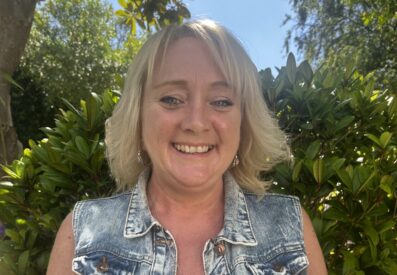Fostering couple Helen and Martin are using their experiences working in a school and raising their own children to help change the lives of children and young people in care.
The empty nesters, who have five children and two grandchildren of their own, began providing respite care with ISP in 2021. Now, they’re fostering two boys aged 12 and 13 long term, providing a home filled with love, laughter, and joy.

How fostering found Helen and Martin
Helen and Martin never really planned to become foster parents – fostering found them.
Helen said, “When my friend and I were made redundant from the school we worked at together, she went straight into fostering with ISP. I just carried on working at a different school, and she kept encouraging me to consider fostering. She’d say, ‘You’d be so good at it, you need to do it’. But at that time, I always said no because we weren’t in a position to commit.”
“At the school, I worked in a nurture unit supporting children with emotional, social, and behavioural challenges. There was one family I worked particularly close with; they had five children, and every day, I’d go to their house and bring them to school.”
“One Friday afternoon, the court ordered them to be taken into care that day, but the social worker was struggling to find anywhere for them to go. Because I knew them so well, and both Martin and I were DBS checked, I said, ‘If it comes to it, we can take them for one night’. The social worker was like, ‘We can’t really do that’.”
“But then it got later and later, and the social worker still hadn’t found a foster home for them, and she said to me, ‘OK, we may need you on this.’ I quickly phoned Martin and said, “We might need five beds for these children tonight.”
“So, he ran around the house, gathering quilts and pillows and finding places for them to sleep. It was utter chaos. In the end, they managed to find a home for the children at around 6 pm. But that experience is what made us seriously start to consider fostering.“
Martin added, “Then, a year later, I was made redundant and needed a change. We’d spoken about fostering, so we decided to go for it. We did all the training and were respite foster parents for the first 12 to 14 months.“
Starting the journey later in life
Foster parents can begin their journey at different stages of their lives; for Helen and Martin, starting in their 50s made the most sense.
Martin said, “We could have started fostering 10 years earlier, but we weren’t ready then. We have five children, and we just didn’t have enough space in our house. We had to wait until they moved in with their partners and freed up rooms.”
Helen continued, “I think we started at the perfect time. We’ve been together since 2011 and needed time to strengthen our relationship before fostering. Now, because we have such a strong relationship, we’re able to do a better job.”
“If we’d been married for 20 years, then we probably would have already had that relationship. But it’s different for everyone. We know lots of younger foster parents who still have young children of their own living at home, and they do a brilliant job. I think it’s about what suits your individual circumstances at the time.“
Martin said, “Starting a bit later also means we’ve had more experience raising our own children and helping with the grandchildren. We’ve both worked in schools too, and built strong relationships with the children, which has really helped us connect with the children we foster. I mean – I’ve even had my nails done and my hair done with clips. It’s just what you do.”
Parenting vs therapeutic fostering
When foster parents have raised their own children, they often have to adapt their parenting style to therapeutically support children in their care who are living with trauma.
The couple said, “We’ve found fostering very different to parenting our own children.”
“You have to show a bit more understanding and not judge a child’s behaviour because kids in foster care can have so many traumas. They may have had five, six, seven, or more traumas in their short lives. You have to think about what these children have been through and support them to move forward.”
Humour gets you through
Helen and Martin harness the power of humour, finding moments of playfulness and joy in every day.
Martin said, “You have to bring the humour into a lot of it because some things just make you shake your head at times. We foster two boys, but the one in particular, who we’ve had for a long time, is very unique in the way he does things and reacts to situations.”
“When we took him on his very first holiday, he was like a magnet to one of us the whole time – me in particular. I’m not into all this entertainment they put on for the kids, the dancing and everything. But he’d encourage me to join in with him.”
“There was this one evening I’ll never forget. I was standing there, trying to copy the lady on the stage – I don’t know what we were doing. I looked to my side, and he was twerking next to my leg. It’s those little things you remember, the small moments that make you laugh or smile.”
Helen added, “You need a kind heart and a sense of humour. Yes, the nurturing, the love and the care are all essential. But I think if you’ve got a sense of humour and a child can see that in you, it can melt away so many other difficulties and help them feel more at home.”
Touching moments
Fostering can be challenging, but during it all, small moments can remind foster parents exactly why they do it. Helen recalled a touching memory that will stay with her forever.
She said, “On New Year’s Eve, one of the boys stood in front of the Christmas tree and asked me to record him doing a speech. It was the loveliest thing ever. He said, ‘I just want to say that Helen and Martin, I love you both very much, and I’m so happy being here with you.’
“It was just this lovely praise for us – Social workers and other people can say, ‘Thank you, you’re doing really well,’ but when it comes from a child in your care, off their own back, with no prompting, it means the world. It was an incredibly special moment for us. We never expected it. You can’t top that, can you?”

Helen and Martin’s advice
Helen and Martin are encouraging people from all walks of life to consider fostering, sharing their advice for prospective foster parents.
Helen said, “Go to some open days. Sometimes, you can meet foster parents, therapists, and social workers. When we went to the open days, they talked about fostering and mental health too, which is really important.”
“If you’re completely new to fostering, maybe try some respite care first just to get an idea of what it’s really like. And don’t be afraid to ask for help – whether it’s filling in forms, doing paperwork, or if you don’t understand something, there’s always someone to help you.”
“You can still work and foster. At one point, we were both working. Some people think they have to be a stay-at-home Mom when they’re fostering just in case they get a call from school or something. But our jobs were quite flexible because they knew what we were doing.”
Martin added, “And don’t believe everything you hear either because there’s a lot of negativity about fostering. Yes, we’ve had our moments with the children, but in general, we’ve loved it. And the emotional reward makes it worth it every day, 100%. We wouldn’t change it.”
Begin your fostering journey with ISP today
If, like Helen and Martin, you’d like to take your career in a new direction by becoming a foster parent, we’d love to hear from you! Call us on 0800 0857 989 or fill in our online enquiry form, and we’ll be in touch.
Together, we can provide more vulnerable children and young people with homes filled with love, laughter, and joy where they can heal from their trauma and have the childhood they deserve.






